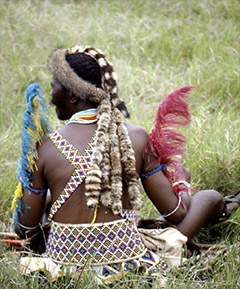ABAQULUSI - What's in the name?
 One of Shaka's first tasks after his installation as an 'in kosi' (chief) of the Zulu polity was to return to kwaNobamba, Senzangakhona's principal homestead, which had been Jama's before him. Here Shaka was welcomed by Mnkabayi kaJama, Senzangakhona's elder sister, who had a strong and domineering personality and a taste for political power acquired when she acted as co-regent after Jama's death in about 1781. She was one of few people who showed kindness and support for Nandi (Shaka's mother) and Shaka during the turbulent and miserable time they endured when they lived with Senzangakhona and his people. It would seem that Mnkabayi, who was a strong-willed, shrewd and calculating woman, must have recognized Shaka's leadership potential and supported him in his drive for the Zulu chieftainship. Shaka never forgot this and subsequently rewarded her by making her head ofthe emBelebeleni ikhanda (military barracks) near the present-day Ulundi.
One of Shaka's first tasks after his installation as an 'in kosi' (chief) of the Zulu polity was to return to kwaNobamba, Senzangakhona's principal homestead, which had been Jama's before him. Here Shaka was welcomed by Mnkabayi kaJama, Senzangakhona's elder sister, who had a strong and domineering personality and a taste for political power acquired when she acted as co-regent after Jama's death in about 1781. She was one of few people who showed kindness and support for Nandi (Shaka's mother) and Shaka during the turbulent and miserable time they endured when they lived with Senzangakhona and his people. It would seem that Mnkabayi, who was a strong-willed, shrewd and calculating woman, must have recognized Shaka's leadership potential and supported him in his drive for the Zulu chieftainship. Shaka never forgot this and subsequently rewarded her by making her head ofthe emBelebeleni ikhanda (military barracks) near the present-day Ulundi.
During his term Shaka became increasingly isolated from his people. The foundations of his Zulu land began to develop cracks into which his enemies poured dangerous dissension. Mnkabayi ka Jama began the first whispers of dissent. With her venomous tongue she began to poison important people against Shaka.lt is said that she was the first person to question Shaka's role in his mother's death. Mnkabayi became increasingly powerful and a problem for the young Shaka in his strive towards making the Zulu nation a powerful force. To try and isolate his power-hungry aunt, Shaka decided to re-deploy her as head of the ebaQuluseni ikhanda. It is said that on her arrival at the ebaQuluseni ikhanda she was utterly dismayed at the lack of what she called homesteads and proper huts.
It is said that she was met by her 'impis' (regiments) in Vryheid town more or less where the Dutch Reformed Church (Moederkerk) is situated now. She apparently asked the soldiers meeting and welcoming her whether it was expected of her to live in barren circumstances. She managed to build this 'ikhanda' to a powerful tool in the history of the Zulu nation. People living in the area became known as the AbaQulusi people, the opener of all main gates, that people might enter. The AbaQulusi regiment was involved in various battles during the South African War, where they encountered both success and failure.
